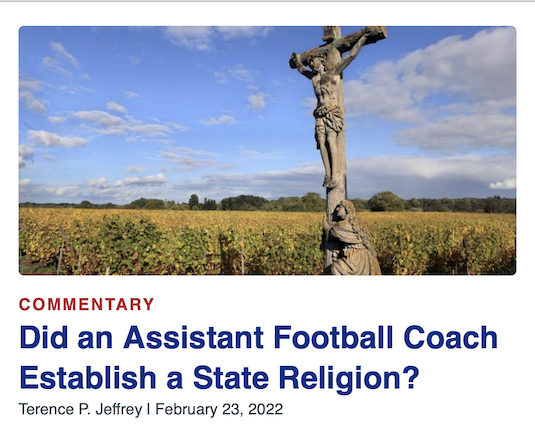CNSNews.com editor Terry Jeffrey devoted his Feb. 23 column to trying to turn a high school football coach into a martyr because he demanded to pray in the middle of the field after a game:
On Oct. 16, 2015, the varsity football team at Bremerton High School took on the varsity team from Centralia High School. After the game, there was an all-American moment. It involved a longstanding postgame activity engaged in by Bremerton assistant coach Joseph Kennedy.
The U.S. Court of Appeals for the 9th Circuit has provided a description of it.
“Kennedy is a practicing Christian,” said the court. “Kennedy’s religious beliefs required him to ‘give thanks through prayer, at the end of each game, for what the players had accomplished and for the opportunity to be a part of their lives through football.
“Specifically,” the court continued, “‘(a)fter the game (was) over, and after the players and coaches from both teams met to shake hands at midfield,’ Kennedy felt called to kneel at the 50-yard line and offer a brief, quiet prayer of thanksgiving for player safety, sportsmanship, and spirited competition.’ Kennedy’s prayer usually lasted about thirty seconds. Kennedy’s religious beliefs required that his prayer occur on the field where the game was played, immediately after the game concluded. This necessarily meant that spectators — students, parents, and community members — would observe Kennedy’s religious conduct.”
The Bremerton School District had barred Kennedy from engaging in this postgame prayer.
“When BSD’s superintendent became aware of Kennedy’s religious observances on the 50-yard line with players immediately following a game, he wrote Kennedy informing him what he must avoid doing in order to protect BSD from an Establishment Clause claim,” explained the 9th Circuit.
The 9th Circuit concluded that had the BSD allowed Kennedy to continue engaging in his quiet on-field prayer after football games, the school district would have violated the Constitution’s ban on establishing a religion.
“We hold that BSD’s allowance of Kennedy’s conduct would violate the Establishment Clause,” said the court, “consequently, BSD’s efforts to prevent the conduct did not violate Kennedy’s constitutional rights, nor his rights under Title VII.”
In sum: This court claims that allowing a public high school assistant coach to quietly pray after a football game is effectively equivalent to establishing a government religion.
Jeffrey is not telling the whole story. The ruling also stated that Kennedy made a point of not cooperating with the district and would play victim in order to generate media coverage:
In response, Kennedy determined he would “fight” his employer by seeking support for his position in local and national television and print media, in addition to seeking support on social media. In a letter from his counsel, he informed BSD that he would not comply with its instructions, and that he intended to continue engaging in the kind of mid-field religious exercises he had been told not to perform. Answering Kennedy’s solicitation, scores of parents, a state representative, and students from both teams rushed to mid-field after a game to support Kennedy against BSD’s efforts to avoid violating the Constitution. All of thiswas memorialized and broadcast by local and national TV stations and print media.
[…]While his prayer may have been brief, the facts in the record utterly belie his contention that the prayer was personal and private. As noted, Kennedy engaged in a media blitz between October 14, 2015—when Kennedy’s attorney informed BSD that he would be reinstituting his prior practice that included allowing students to join his prayer —and October 16, 2015. Kennedy’s deposition included the following exchange: “Q. So you appeared on the media because you wanted to spread the word about what you were doing? A. I was sharing the word, yes, sir.”
When Kennedy declared in a Facebook post that “I think I just might have been fired for praying,” the school district “was flooded with thousands of emails, letters, and phone calls from around the country” regarding the conflict over Kennedy’s prayer, “many of which were hateful or threatening.”
There was also an expectation that players were expected to take part in Kennedy’s prayer and feared consequences if they did not. The ruling noted “a parent’s complaint that his son ‘felt compelled to participate’ in Kennedy’s religious activity, even though he was an atheist, because ‘he felt he wouldn’t get to play as much if he didn’t participate.'”
The ruling also noted that the school district “had a compelling state interest to avoid violating the Establishment Clause, and it tried repeatedly to work with Kennedy to develop an accommodation for him that would avoid violating the Establishment Clause while nevertheless offering him options that were narrowly tailored to protect his rights.”
Nevertheless, Jeffrey continued to put his fact-free spin on things: “The Supreme Court will decide this spring whether a public school football coach has a First Amendment right to say a quiet prayer on a public field after a game. Of course he does.” True, but not the way the coach was actually going about doing it, according to lower courts — and Jeffrey hid that information from his readers.
